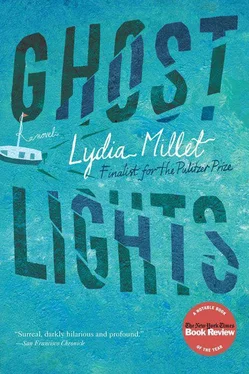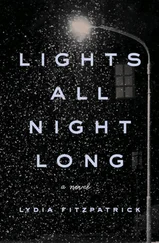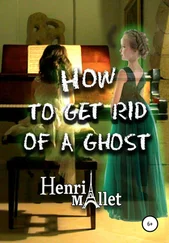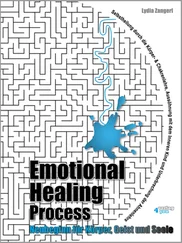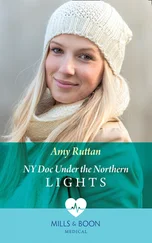Lydia Millet - Ghost Lights
Здесь есть возможность читать онлайн «Lydia Millet - Ghost Lights» весь текст электронной книги совершенно бесплатно (целиком полную версию без сокращений). В некоторых случаях можно слушать аудио, скачать через торрент в формате fb2 и присутствует краткое содержание. Издательство: W. W. Norton & Company, Жанр: Современная проза, на английском языке. Описание произведения, (предисловие) а так же отзывы посетителей доступны на портале библиотеки ЛибКат.
- Название:Ghost Lights
- Автор:
- Издательство:W. W. Norton & Company
- Жанр:
- Год:неизвестен
- ISBN:нет данных
- Рейтинг книги:5 / 5. Голосов: 1
-
Избранное:Добавить в избранное
- Отзывы:
-
Ваша оценка:
- 100
- 1
- 2
- 3
- 4
- 5
Ghost Lights: краткое содержание, описание и аннотация
Предлагаем к чтению аннотацию, описание, краткое содержание или предисловие (зависит от того, что написал сам автор книги «Ghost Lights»). Если вы не нашли необходимую информацию о книге — напишите в комментариях, мы постараемся отыскать её.
How the Dead Dream
Ghost Lights
Ghost Lights
Ghost Lights — читать онлайн бесплатно полную книгу (весь текст) целиком
Ниже представлен текст книги, разбитый по страницам. Система сохранения места последней прочитанной страницы, позволяет с удобством читать онлайн бесплатно книгу «Ghost Lights», без необходимости каждый раз заново искать на чём Вы остановились. Поставьте закладку, и сможете в любой момент перейти на страницу, на которой закончили чтение.
Интервал:
Закладка:
At the same time he had felt himself fading in and out of the installations like patterns of sunlight or lines of insects; according to his mood he might be a partner in their solidity, a detractor or an opponent, but he had passed from outside to inside and become culpable for the world.
That was the price you paid for the feeling of inclusion: the buildings, the grids of cities with their roads and subways, their storefronts and systems turned approachable, even trivial. The two of you were locked in an interdependence in which you were both always decaying. .
He had been bred to feel like an insider, no doubt — had grown up in an affluent Southern California suburb in the wake of the war, though the fifties and sixties were the time he remembered. It had been a pleasant blur of a youth. Sun on the lawns, his mother and father sitting at a thick pine table in the evening by lamplight. Braided placemats, soft butter in a dish and green beans in a bowl. The gentle sheen of the wood.
Time was like the table when he tried to recollect his childhood — vague but solid, fingerprinted and warm.
“Hal?”
It was Susan, on the other side of the door. She often lost him in bathrooms.
“Coming. Just a second,” he said, and dried his hands on a soft paper towel. He had read a pamphlet that said the softest and thickest towels and toilet rolls were made not from woodchips but from the ancient giants: you wiped your ass with the history of the world. . what was different for him and for Susan too, for anyone whose life had been interrupted, was that after that ascension to the citadel he had suddenly been ejected again. He’d been ejected from that communal life of achievers, the life of regularity. He had found himself there, in the span of the arches and the rise of the walls — that quick belonging, those years of lockstep — and then, with the accident, he was outside again forever. His own childhood and Casey’s merged in his recall, encased in a golden glow; at the moment of her paralysis the childhood turned into a lost paradise, and so it would remain — for as long as he lived he would not be able to shrug off the sense of this loss. It left him with the sear of heartbreak and the pressure of resentment.
You worked, of course, to get clear of that resentment, to give it up like an offering. But it was a struggle that did not end. One day you felt it rise from you and disperse, you felt an upsurge of freedom, but the next day it settled on you again.
He existed, in fact, half in the moment of her childhood, suspended for all time. The memory dogged him with such persistence that he wished he could replace it with one that was less glowing, more tarnished and scuffed. The shine of her lost joy was blinding.
Of course the memory was not the childhood itself but a vision of it he had created without wishing or trying to — a memory as unchanging as the accident itself, formed almost at the same moment, or at least at the moment when he was told, in the hospital, that the damage was permanent. At that instant a barrier was thrown up between what was and what should have been, a future for his little girl that had never been permitted. The childhood memory was a bridge between them, between then and now, which had to stay separate to be bearable. But there it shimmered, with a deceitful, sly nostalgia.
The dog woman came out from the back office trailing the dog on a sturdy brown-leather lead. No cheap and functional nylon for Thomas Stern. But Hal had to admit he took to the animal right away. She walked gamely, hopping with her hindquarters; she wore an attentive expression and wagged her tail.
He glanced at Susan: her eyes were filling with tears.
“Let me,” he said softly, and reached out to hold the leash.
Susan knelt down and petted the dog, put her arms around it.
It was all Stern’s fault. Stern had been an imposition on the family from start to finish. First he was an imposition on Susan, demanding her full-time loyalty as the caretaker of all the most trivial details of his gainful enterprise; into their quiet home had come long discussions of his youth and conscientiousness, even his overpriced wardrobe and alleged charisma. The latter of which was a myth Hal saw no reason to believe.
As a husband he had been forced to endure this intruder in his house constantly — not his physical presence but the daily, dull news of him. Many times he had wished that Susan was employed in an office with more personnel, for the sake of a little variation in her bulletins from the workplace. He himself was stationed in an office whose very size kept him from getting on oppressively intimate terms with any of his colleagues.
Then he had imposed himself on Casey — who knew how, Hal did not open his mind to the permutations, but he and Casey had been close, briefly — and now, missing, possibly even deceased, he was imposing on all of them.
• • • • •
The mutt sat in the back seat of the car, her ears forward, watching and listening. Hal drove.
“If she sheds a lot we can spread out a blanket back there,” he said.
Susan gazed out the windshield.
“Casey might want her,” she offered after a few minutes.
“Maybe she could have the dog some days but not all the time. That would be easier.”
But strangers might laugh at them. Someone might laugh to see the girl in the wheelchair, walking a tripod dog.
He did not say this, of course.
They lapsed into silence until he turned into the grocery-store parking lot. They had to buy dishes and dog food.
“I’ll stay with her,” said Susan, so he rolled down the windows, crossed the lake of pavement and went into the store alone.
In the dry-goods aisle, where he gazed at brands of dog food, hypnotized and vacant, he felt himself floating back. It was the chief pitfall of any time he spent alone, anywhere from minutes to long hours. At work he did not drift so easily, because work occupied him. It commandeered his attention in a way that offered relief.
Casey had picked out a white kitten at the Humane Society and that was the last time he remembered being in a pet food aisle — although he must have bought cat food in the succeeding years, of course, after the kitten had grown into a cat, but he did not recall this. The cat had finally died shortly before the accident, of a kidney infection. But the first day of the kitten, with his six-year-old Casey in her blond ponytail, he had walked up and down an aisle indistinguishable from this one — it might even have been this one; they might have walked here together — holding her small hand.
He looked down at his own hand, which had flexed suddenly as though feeling the imprint.
Casey had gazed up at him and asked him why kittens didn’t eat people food. His thoughts flicking briefly over slaughterhouse by-products and rendering and bone meal and carbolic acid and what “gourmet lamb entree” was code for, he told her smiling that kittens just liked cat food better.
Such was the duty of fatherhood, he had thought to himself, neatly satisfied at a simple task well accomplished, and reached for a bag of Purina.
Standing in front of the bags again, red backgrounds with head shots of golden retrievers, cocker spaniels, he wished it had all been so easy, even if it was a lie and a facile one too. What he would give now to be able to hand her such a lie in place of the life she had. Anything. He would have no qualms at all, not one. He would lie through his teeth if it would do any good. If only lies would suffice.
• • • • •
There was a libertarian in his office. It happened fairly often.
This one believed carmakers should pay for all roads. He was a hefty man in his thirties and his face was red with anger as he sat in the seat across from Hal’s desk; understandably, in a way, since his house had been seized by a revenue officer.
Читать дальшеИнтервал:
Закладка:
Похожие книги на «Ghost Lights»
Представляем Вашему вниманию похожие книги на «Ghost Lights» списком для выбора. Мы отобрали схожую по названию и смыслу литературу в надежде предоставить читателям больше вариантов отыскать новые, интересные, ещё непрочитанные произведения.
Обсуждение, отзывы о книге «Ghost Lights» и просто собственные мнения читателей. Оставьте ваши комментарии, напишите, что Вы думаете о произведении, его смысле или главных героях. Укажите что конкретно понравилось, а что нет, и почему Вы так считаете.
